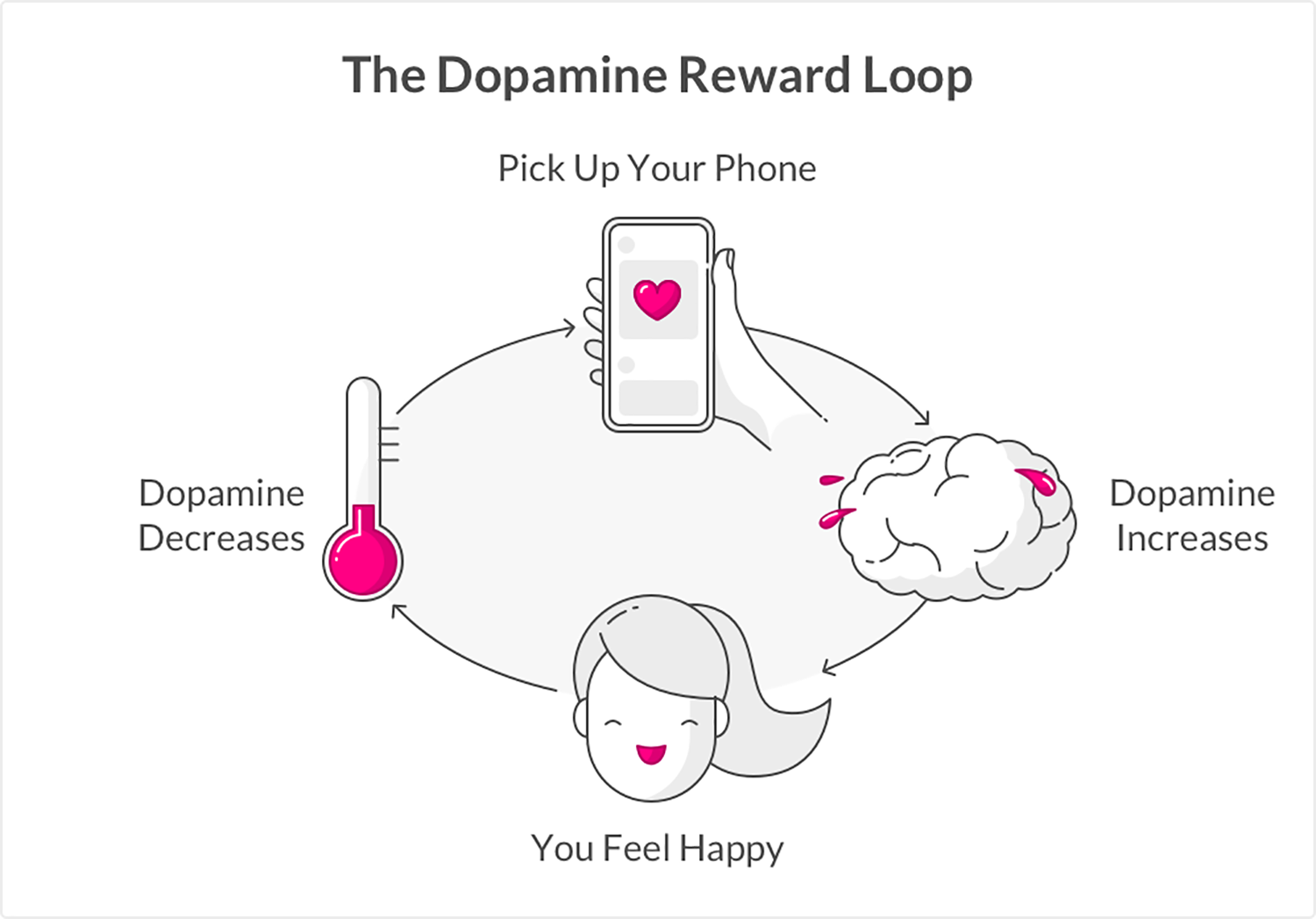Only 5% of adults in the United States believe social media is positive, while 38% view it as harmful. There can be positive aspects of social media such as connection and community building. However, the consensus from recent studies is that social media has dire effects on our mental health and well-being.
Social media can cause anxiety, depression, loneliness, sleeping problems, and a fear of missing out (FOMO). Whether small or large, social media causes ripples in our daily lives that we may not notice. So let’s take a second to pause and learn more. 
What Causes Social Media Addiction?
Social media is a wonderful tool to express yourself creatively. It is an outlet for personality building and brings in the community. And when we put a vulnerable piece of us out into the world we are hoping for positive feedback in return.
Social media provides a positive feedback loop where dopamine increases due to the feeling of being reassured through likes, comments, and shares. When someone experiences something rewarding, neurons are passed through the dopamine-producing parts of the brain, causing dopamine levels to rise, and feelings of pleasure to set in.
 via Lemonade
via Lemonade
Positive effects of Social Media
Connection and community building
Social media has had a significant impact on community building and connection by providing a platform for individuals to connect and engage with others who share similar interests, values, and experiences. Through social media, individuals can join groups and communities centered around topics such as mental health, fitness, and more.
These communities provide a sense of belonging and support for individuals who may feel isolated or disconnected from their offline communities.
Overall social media can play a positive role in building and strengthening communities, providing individuals with opportunities for social support and engagement.
.jpg?width=4592&height=3064&name=eaters-collective-i_xVfNtQjwI-unsplash%20(1).jpg) via Eaters Collective
via Eaters Collective
Access to Information and Resources
Additionally, social media has made it easier than ever to access a wealth of information and resources on a wide range of topics. For example, individuals can follow news outlets, organizations, and public figures to stay informed about current events, political developments, and important social issues.
Social media platforms also provide a platform for experts to share their knowledge and insights, allowing individuals to learn about specialized topics and stay up-to-date on the latest research and developments.
Support and Validation
In connection with the wide range of access to topics. Through social media, individuals can connect with others who have similar experiences and access information about the topics that interest them. Or topics that are necessary for health and safety.
You can share your experiences, struggles, and successes with others who may be going through similar challenges. This source of validation can be beneficial for individuals who may struggle with low self-esteem or feelings of insecurity.
But as mentioned before, this positive attribution may lead to a serious rabbit hole.
Negative Effects of Social Media
In the mid-2000s smartphones became widely popular with the release of devices such as the iPhone and the BlackBerry. Since then, mental health issues have increased significantly. The rate of adolescents reporting systems of major depressive disorder year over year increased by 52% from 2005 - 2017. For young adults, ages 18 - 25, it increased by 63%.
Let’s chat about some of the negative effects social media can have on mental health and well-being ⬇️
Comparison and Self-Esteem Issues
One of the challenges of social media is the tendency for individuals to compare themselves to others. Social media platforms are often used to showcase the best aspects of individuals' lives, leading to a distorted perception of reality. This can result in feelings of inadequacy, low self-esteem, and anxiety.
Additionally, social media can be a source of pressure to conform to societal expectations, such as beauty standards, which can further exacerbate feelings of insecurity and self-doubt.
The constant stream of curated images and lifestyles can lead individuals to compare themselves to others and feel like they are not measuring up.
Cyberbullying and Harassment
Recently, Selena Gomez and Haley Baldwin have been at the forefront of social media. Getting backlash from opposing fans and terrible comments from unrelenting social media trolls.

via @hungvanngo
For Selena Gomez, this came with commentary about her body. She recently said she would post on her social media “saying it doesn’t bother me because I didn’t want it to bother other people who are experiencing the same thing, getting shamed for what they look like, who they are, and who they love” she added. “All the while, being in my room posting and crying my eyes out because nobody deserves to hear those things”
Social media can provide a platform for cyberbullying, as individuals can hide behind anonymous usernames or create fake profiles to harass others. Cyberbullying can take many forms, including posting derogatory comments or messages, sharing embarrassing photos or videos, and spreading rumors or lies about an individual. Individuals need to take steps to protect themselves and seek help if they experience cyberbullying or harassment on social media.
Addiction and Time-Wasting
As mentioned above, social media can be highly addictive, as individuals can quickly become engrossed in scrolling through their feeds, checking notifications, and engaging with other users.
They are designed this way.
The constant stream of content can be overwhelming, leading to a sense of FOMO and a compulsion to stay connected. The negative consequences of excessive social media use can include decreased productivity, poor sleep, and reduced social connections in real life.
How to Notice a Social Media Addiction
While many people use social media consistently, not everyone has a social media addiction. According to The Addiction Center, you can determine if you or someone you know is developing an addiction to social media by asking these 6 questions:
- Do they spend a lot of time thinking about social media or planning to use social media?
- Do they feel urges to use social media more and more?
- Do they use social media to forget about personal problems?
- Do they often try to reduce the use of social media without success?
- Do they become restless or troubled if unable to use social media?
- Do they use social media so much that it has had a negative impact on their job or studies?
If ‘yes’ is answered for 3 or more of these, there is a possible presence of social media addiction.
Solutions and Strategies to Use Social Media in a Healthy Way
There is an undeniable link between social media and poor mental health. The Addiction Center adds “Social media facilitates an environment in which people are comparing their realistic offline selves to the flawless, filtered, and edited online versions of others, which can be detrimental to mental well-being and perception of self”.
However, there are some ways to cope with social media in ways that feel healthy.
- Limiting social media use (obvious but important)
- Engaging in offline activities and face-to-face interactions
- Being mindful of the content consumed and shared
- Turn off notifications
- Keep your phone away while you sleep
- Use it as a small reward, not a primary one
- Set time limits on your phone
At SohoMD, we take a personalized approach - your concierge of care - creating a customized treatment plan with the right mix of modalities, medicines, supplements, and lifestyle changes for your whole life. Find a provider today.


 via
via .jpg?width=4592&height=3064&name=eaters-collective-i_xVfNtQjwI-unsplash%20(1).jpg) via
via 
